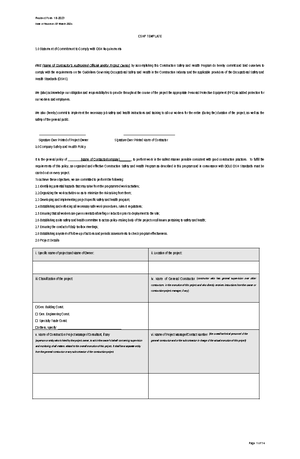- Information
- AI Chat
Was this document helpful?
Lesson 5 - Exercices - Politics, Governance and Citizenship
Course: Politics, Governance, and Citizenship (GEED 20023)
93 Documents
Students shared 93 documents in this course
University: Polytechnic University of the Philippines
Was this document helpful?

1. Differentiate Natural Born Citizen from Naturalized Citizen
A Natural Born citizen is whose parents were the citizens of that country at the
time of his or her birth. Natural born Filipinos are those who are citizens from
birth without having to perform any act to acquire or perfect their Philippine
citizenship. Also, those who elect Philippine citizenship are in accordance with
the Constitution. On the other hand, a Naturalized Citizen is a person who is
originally from another country that went through a legal process to acquire
citizenship or nationality of a different country.
2. Who are citizens of the Philippines as provided for by the Constitution?
The considered citizens of the Philippines are those:
● Who are citizens of the Philippines at the time of the adoption of this
Constitution
● Whose fathers or mothers are citizens of the Philippines
● Born before January 17, 1973, of Filipino mothers, who elect Philippine
citizenship upon reaching the age of majority; and
● Who are naturalized in accordance with the law.
3. Explain the reason behind the constitutional prohibition against dual
allegiance.
According to Article IV, Section 5 of the Constitution provides: "Dual
allegiance of citizens is inimical to the national interest and shall be dealt with
by law." Dual allegiance refers to a person who has loyalty to two or more
states. This kind of loyalty can be a threat to the state or to the national
interest.
4. Discuss the similarities and differences of repatriation and naturalization.
Naturalization and repatriation are processes of becoming a citizen of a
country. The difference is that Naturalization is a mode for both acquisition
and reacquisition of Philippine citizenship. As a mode of initially acquiring
Philippine citizenship, naturalization is governed by Commonwealth Act No.
473, as amended. On the other hand, naturalization as a mode for reacquiring
Philippine citizenship is governed by Commonwealth Act No. 63. Under this
law, a former Filipino citizen who wishes to reacquire Philippine citizenship
must possess certain qualifications and none of the disqualifications
mentioned in Section 4 of C.A. 473. Repatriation, on the other hand, may be
had under various statutes by those who lost their citizenship due to: (1)
desertion of the armed forces; (2) service in the armed forces of the allied
forces in World War II; (3) service in the Armed Forces of the United States at
any other time; (4) marriage of a Filipino woman to an alien; and (5) political
and economic necessity. As distinguished from the lengthy process of
naturalization, repatriation simply consists of the taking of an oath of
Students also viewed
Related documents
- Dela Torre, Michaella A.- BSBA HRM 2-4N Activity #1 Question #4
- Dela Torre, Michaella A.- BSBA HRM 2-4N Activity #1 Question #2
- Dela Torre, Michaella A.- BSBA HRM 2-4N Activity #1 Question #5
- Poligov - Develop and formulate your proposition as you watch the uploaded video
- Poligov Assignment 3 - Do you think China's actions in the South China Sea is amenable or agreeable with its neighbors
- Poligov Assignment 2 - How would you elaborate your political thought or belief as it turned out in the results of the political quiz









